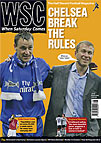 Ugly commercialism aside, Paul Joyce hails the pleasing diet of positive football at the Confederations Cup as well as tentative signs of revival in the German national side
Ugly commercialism aside, Paul Joyce hails the pleasing diet of positive football at the Confederations Cup as well as tentative signs of revival in the German national side
As a dry run for next year’s World Cup finals, the 2005 Confederations Cup had many positive aspects. Not among them, however, was the rampant commercialism that included the sponsoring not only of the 22 player escorts who accompanied the teams onto the pitch, but also of the child carrying the referee’s tossing coin. All vestiges of local cuisine had been removed from the five stadiums. Gone too was FIFA president Sepp Blatter’s original intention of dedicating the tournament to Cameroon’s Marc-Vivien Foé who died of a heart attack at the 2003 Confed-Cup in France.
The major sponsors were instead Anheuser-Busch, whose unpopular choice of a weak Michael Ballack as man of the match in the Germany v Australia game seemed to rest on the assumption that his multi-national sponsorship deals made him the only German player likely to be recognised in the US. Small wonder that the Alliance of Active Fans (BAFF) informed German Sports Minister Otto Schily that 90 per cent of their members had no interest in the Confederations Cup.
Much more palatable was the commitment to attacking football displayed by all eight participating countries. This included the hosts whose new red away shirts supposedly expressed “aggressiveness, passion and positive energy”. Scoring 11 goals in the first four matches of the tournament meant that Germany averaged a healthy 2.6 goals per game since Jürgen Klinsmann took over as manager in July 2004.
Germany’s 2-2 draw with Argentina that secured victory in Group A was as tactically disciplined a performance as any produced by Rudi Völler’s 2002 World Cup finalists – this time with a team whose average age was only 23. Ignoring Franz Beckenbauer’s Hansenesque warnings that you can’t win a World Cup with kids, Klinsmann has based his squad around a nucleus of young media-friendly players untainted by previous failures and down-to-earth enough for jaded German fans to identify with. “In Euro 2004 many fans thought the players were millionaires who deserved to go home,” said general manager Oliver Bierhoff, “but now we have a few interesting players in the squad.”
These include the composed centre-back Per Mertesacker, who combined club football for Hanover 96 with community work with the severely disabled, Bayern Munich midfielder Bastian Schweinsteiger and charismatic 20-year-old striker Lukas Podolski, who stayed faithful to 1.FC Cologne last season despite their relegation to the second division. Podolski’s six goals in 14 internationals have inspired hope that Germany may eventually become less dependent on Michael Ballack to penetrate stubborn defences than they had been in the flattering 3-0 group victory over Tunisia.
Germany’s defensive frailties were exposed throughout the tournament however, with former Aston Villa midfielder Thomas Hitzlsperger performing unconvincingly in the troublesome left-back position. With the turning circle of a distressed oil tanker, Chelsea’s Robert Huth proved a particular liability in central defence. His inability to cope with Adriano was a key factor in Germany’s 3-2 semi-final defeat by Brazil, which was still greeted by standing ovations from the 42,000 capacity crowd in Nuremberg’s Frankenstadion.
Indeed, despite the fact that Germany have not beaten top-ranked opposition since Dietmar Hamann’s free-kick defeated England at Wembley in October 2000, 48 per cent of Germans now believe that they can win the 2006 World Cup.
Klinsmann, however, has yet to win over some Bundesliga coaches who question his lack of managerial experience and his decision to base himself in Los Angeles, using video conferencing to contact the German football association in Frankfurt. “When Bayern Munich are playing a championship decider, the national manager has to be in the stadium,” stated Bayern general manager Uli Hoeness pointedly, “and not watching the match on ESPN in California.”
There have also been clashes with Bayern over Klinsmann’s refusal to select his first-choice World Cup goalkeeper until May 2006, which in Hoeness’s opinion has placed the incumbent Oliver Kahn under unnecessary pressure. With even goalkeeping coach Andreas Köpke advocating a clear decision, Kahn’s bitter rival Jens Lehmann was barracked by the Munich crowd in May when playing for a German XI to mark the opening of the city’s Allianz Arena. Klinsmann had sacked the long-time goalkeeping coach, Sepp Maier, in October 2004 for favouritism to-wards Kahn, which prompted Klinsmann’s arch- rival Lothar Matthäus to brand him a “killer who walks over corpses”.
Even with the return of players such as Miroslav Klose and Christian Metzelder, the World Cup looks to be coming a couple of years too soon for Klinsi’s “Boy-Group”. It therefore remains to be seen whether the manager accedes to pressure to reinstate experienced campaigners such as Hamann, Wörns and Nowotny.
From WSC 222 August 2005. What was happening this month